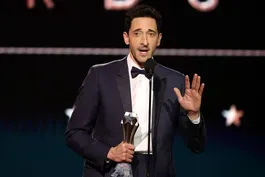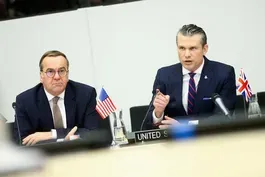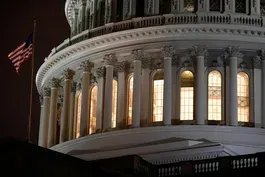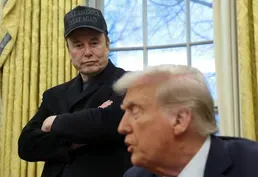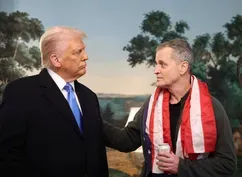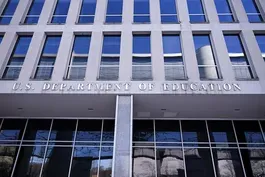
Experts on what U.S. policy shifts on Ukraine mean for NATO
Clip: 2/12/2025 | 8m 11sVideo has Closed Captions
Experts examine what the U.S. policy shifts on Ukraine mean for NATO
It was a day of major diplomacy and policy statements from the Trump administration about the war in Ukraine. Amna Nawaz has two perspectives on the developments from Evelyn Farkas, executive director of the McCain Institute and the former deputy assistant secretary of defense for Eurasia, and John Mearsheimer, author of "The Great Delusion: Liberal Dreams and International Realities."
Major corporate funding for the PBS News Hour is provided by BDO, BNSF, Consumer Cellular, American Cruise Lines, and Raymond James. Funding for the PBS NewsHour Weekend is provided by...

Experts on what U.S. policy shifts on Ukraine mean for NATO
Clip: 2/12/2025 | 8m 11sVideo has Closed Captions
It was a day of major diplomacy and policy statements from the Trump administration about the war in Ukraine. Amna Nawaz has two perspectives on the developments from Evelyn Farkas, executive director of the McCain Institute and the former deputy assistant secretary of defense for Eurasia, and John Mearsheimer, author of "The Great Delusion: Liberal Dreams and International Realities."
How to Watch PBS News Hour
PBS News Hour is available to stream on pbs.org and the free PBS App, available on iPhone, Apple TV, Android TV, Android smartphones, Amazon Fire TV, Amazon Fire Tablet, Roku, Samsung Smart TV, and Vizio.
Providing Support for PBS.org
Learn Moreabout PBS online sponsorshipAMNA NAWAZ: For perspective on all this now, we get two views.
Evelyn Farkas is the executive director of the McCain Institute at Arizona State University.
During the Obama administration, she served as deputy assistant secretary of defense for Eurasia.
And John Mearsheimer is a political science professor at the University of Chicago.
He's written extensively about U.S. national security.
Welcome to you both and thanks for joining us.
Evelyn, start us off here.
I just want to get your reaction to the secretary of defense's remarks, particularly this reversal of U.S. policy, saying the U.S. does not believe that NATO membership for Ukraine is realistic or a return to the pre-2014 borders.
What do you make of that and who does that benefit?
EVELYN FARKAS, Former Defense Department Official: Yes, I mean, first of all, Amna, it's tactically not really a move that helps the president in terms of achieving his overall objective, which is peace in Ukraine, because by telegraphing that our position is now closer to the Russian position, it appears, we are reducing our leverage on Russia.
And, at the end of the day, everyone knows that, if we want this war to end, the one person who can end the war overnight is Vladimir Putin.
The Ukrainians don't want to fight, but they have to fight because they're fighting for their sovereignty.
And they won't accept any kind of trade of their territory without a firm security guarantee.
And a security guarantee without the United States involved will not stop Vladimir Putin.
That's the reality.
AMNA NAWAZ: John, what do you make of that?
JOHN MEARSHEIMER, University of Chicago: Well, I think it's quite remarkable what the secretary of defense said today.
He is basically saying that he accepts the Russians' two major conditions for moving toward a peace settlement.
The Russians have said that, before serious negotiations can even begin, the West and Ukraine have to accept the fact that Ukraine will not be a NATO, that it will be a genuinely neutral country.
And, number two, the West has to accept the fact that Russia has annexed the four oblasts in the east that it now in large part controls and Crimea.
And the secretary of defense basically said that Ukraine is not going to be a NATO, the United States is not going to give Ukraine a security guarantee.
That sounds like a neutral Ukraine to me.
And, furthermore, although he didn't specify what territory the Russians can keep, he sounded like he was very close to saying they can keep those four oblasts that they have annexed and Crimea.
So I think this is an amazing statement and it's almost complete reversal of what the Biden administration was doing in Ukraine.
AMNA NAWAZ: Evelyn, we also heard from the secretary of defense that Europeans will now need to provide the security guarantees for Ukraine, not the U.S. and not NATO.
And you heard there he also said that if Europeans troops are to act, they're going to be acting on their own without the Article 5 protection, meaning an attack on one is an attack on all.
What does that mean in practical terms on the ground in Ukraine and also for the NATO alliance more broadly?
EVELYN FARKAS: Yes.
Yes, I mean, Amna, first of all, everybody agrees the Europeans need to do more in terms of providing for their own defense and the defense of the continent.
But let's not be naive.
Vladimir Putin is not afraid of the Europeans without the United States backing up the Europeans, which is to say, he's afraid of NATO, and he will not make another move on Ukraine if Ukraine is a NATO.
However, if Ukraine is not a NATO, meaning -- and that there's a security guarantee just from the Europeans, that is not going to be sufficient to stop Vladimir Putin.
Let's remember Vladimir Putin has an imperialist agenda.
He wants to take Ukraine.
He's not going to stop there.
He's going to go for Moldova.
He's going to go for Georgia.
He's going to go for the former NATO states, the Baltic states.
And guess who's watching all this?
His partner.
They're closely allied.
There's no way to split the China-Russia threats from one another.
China is watching.
China will make a move on Taiwan and China will not stop there.
China has disputed territories with Japan, the Philippines.
We have alliances with those countries.
I can go on.
You don't have time.
But the reality is that it's very dangerous if we leave the security guarantee purely to the Europeans.
AMNA NAWAZ: John, does this further embolden Putin?
And if you're a NATO ally listening to these remarks, does this say to you that the U.S. is no longer a reliable partner?
JOHN MEARSHEIMER: Well, I think with regard to your first question, Putin has no interest in conquering all of Ukraine, much less conquering countries in Eastern Europe.
He has never said he had any interest in conquering all of Ukraine, much less recreating the Soviet Union or anything like that.
Furthermore, he simply doesn't have the capability to do that.
You can see how much trouble he has had just conquering the Eastern one-fifth of Ukraine.
The idea that this is the Wehrmacht and it's highly poised to overrun Europe is not a serious argument.
He wants a big chunk of territory in Eastern Europe, and he is in all likelihood going to get that, in large part because he's winning on the battlefield.
One of the reasons that Trump is now cutting our losses is that Trump and his lieutenants understand that we have lost on the battlefield.
Or, to put it in slightly different terms, the Ukrainians have lost.
We have no leverage anymore.
Trump is facing up to reality.
So I don't think there's any danger of Vladimir Putin finishing off Eastern Ukraine and then moving into Western Ukraine and then moving into Eastern Europe.
AMNA NAWAZ: Evelyn, I saw you shaking your head.
I will give you a brief moment to respond there.
EVELYN FARKAS: Well, Vladimir Putin has telegraphed very clearly in speeches and writings what his vision is.
He wants to recreate the Soviet Union exactly.
He wants to recreate the old Russian empire.
That is his agenda, make no mistake.
And he will not stop with Ukraine, and he will not stop with some oblasts, some territories.
So I think the danger will only heighten after he gets his way, if he gets his way with Ukraine.
AMNA NAWAZ: John, we heard from President Trump now that the negotiating teams have now been selected, and he hopes that this will help to bring an end to the war.
Do you see those negotiations yielding success?
What do you think comes of those talks?
JOHN MEARSHEIMER: Well, these are very tricky negotiations, because he has to get the Ukrainians on board as well.
It's not just the United States.
He also has to pay attention to what his European allies are interested in doing.
The United States is clearly the main force driver here.
There's no question about that.
But it's not just us alone.
So it'll be somewhat difficult to wrap up some sort of agreement from that perspective.
But furthermore, you want to understand that Putin is interested in a much broader security agreement.
He's not just interested in shutting down the war in Ukraine.
He's fully aware that there are a number of other serious flash points in Eastern Europe.
I could name six potential flash points that we should worry about and that Putin should worry about.
And what he'd like to do is get some sort of comprehensive security architecture for Europe in general, and certainly for the Eastern half of Europe, so that we don't go down this road again and have a replay of the war in Ukraine.
AMNA NAWAZ: Evelyn, in a few seconds I have left, do you think these peace talks, these negotiations will yield success?
EVELYN FARKAS: Amna, if they do, it will take some time.
We could get a quick cease-fire, but I don't think we're going to have a comprehensive peace deal over the weekend at the Munich Security Conference.
AMNA NAWAZ: Evelyn Farkas, John Mearsheimer, thank you to you both.
Appreciate your time.
JOHN MEARSHEIMER: You're welcome.
Adrien Brody unpacks his performance in 'The Brutalist'
Video has Closed Captions
Adrien Brody unpacks his performance as a complicated man driven by art in 'The Brutalist' (8m 7s)
DOGE needs to be more transparent, former GAO head says
Video has Closed Captions
Musk's DOGE needs to be 'much more transparent' in spending cuts, former GAO head says (6m 35s)
Hegseth tells NATO Ukraine membership unlikely
Video has Closed Captions
Hegseth tells NATO Ukraine membership unlikely as Trump says Putin will discuss ending war (4m 15s)
House Republicans reveal their budget blueprint
Video has Closed Captions
House Republicans reveal their budget blueprint (5m 22s)
Musk's influence grows as Trump hands him more power
Video has Closed Captions
Elon Musk's influence in the White House grows as Trump hands him more power (6m 19s)
News Wrap: U.S. frees Vinnik in Russian prisoner swap
Video has Closed Captions
News Wrap: U.S. frees cybercriminal Vinnik in Russian prisoner swap for Mark Fogel (6m 35s)
Trump's vision for dismantling the Department of Education
Video has Closed Captions
Trump's vision for dismantling the Department of Education (6m 11s)
Providing Support for PBS.org
Learn Moreabout PBS online sponsorshipMajor corporate funding for the PBS News Hour is provided by BDO, BNSF, Consumer Cellular, American Cruise Lines, and Raymond James. Funding for the PBS NewsHour Weekend is provided by...

